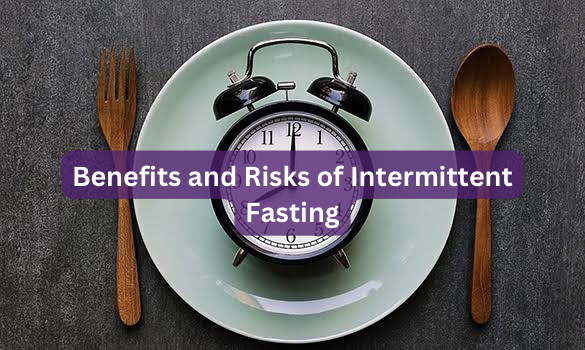Benefits and Risks of Intermittent Fasting

Intermittent fasting (IF) is an eating pattern that involves alternating periods of fasting and eating. Here are some potential benefits and risks associated with intermittent fasting.
Benefits of Intermittent Fasting
1. Weight Loss
Intermittent fasting can be an effective tool for weight loss. By restricting the eating window, it can help reduce overall calorie intake and promote fat burning.
2. Improved Insulin Sensitivity
IF has been shown to improve insulin sensitivity, which can be beneficial for individuals with type 2 diabetes or those at risk of developing it. It may help regulate blood sugar levels and reduce the risk of insulin resistance.
3. Reduced Inflammation
Some studies suggest that intermittent fasting may help reduce inflammation in the body, which is associated with various chronic conditions like heart disease, arthritis, and certain cancers.
4. Enhanced Brain Health
This type of fasting has been found to promote the growth of nerve cells, protect against age-related cognitive decline, and improve brain function. It may also have potential benefits in reducing the risk of neurodegenerative disorders such as Alzheimer’s and Parkinson’s diseases.
5. Simplified Eating Routine
IF can simplify meal planning and eliminate the need for frequent snacking. It may help some people develop a healthier relationship with food and reduce mindless eating.
Risks and Considerations of Intermittent Fasting:
1. Nutritional Deficiencies
In some cases, intermittent fasting can lead to inadequate nutrient intake, particularly if the eating periods are not well-balanced or if individuals do not pay attention to their nutritional needs. It is crucial to ensure a balanced diet during the eating windows to meet nutritional requirements.
2. Disordered Eating
Intermittent fasting may not be suitable for individuals with a history of disordered eating or those prone to restrictive eating patterns. It can potentially trigger or exacerbate unhealthy behaviors related to food and body image.
3. Low Energy Levels and Irritability
During the fasting periods, some individuals may experience low energy levels, irritability, or difficulty concentrating. These symptoms may vary among individuals and depend on factors such as fasting duration and individual metabolism.
4. Potential For Overeating
In some cases, individuals may compensate for the fasting period by overeating during the eating window, which can hinder weight loss goals. It is important to maintain portion control and make healthy food choices during the eating periods.
5. Unsuitability For Certain Populations
Intermittent fasting may not be appropriate for pregnant or breastfeeding women, individuals with certain medical conditions, or those taking specific medications. It is important to consult with a healthcare professional before starting such fasting, especially if you have any underlying health concerns.
Remember that the effectiveness and suitability of intermittent fasting can vary between individuals. It’s always a good idea to consult with a healthcare professional or a registered dietitian before starting any new diet or eating pattern to ensure it aligns with your specific needs and health goals.







